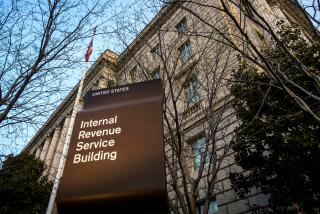IRS Delays Tax Rule on Employee Stock Plans
- Share via
The Internal Revenue Service has temporarily shelved a proposal to force employers to withhold income and employment taxes on incentive stock option plans and employee stock purchase plans.
The IRS, which has been pursuing the matter in court, issued a notice Thursday that said it had imposed a two-year moratorium on asking employers to withhold the taxes. An IRS spokesman had no further comment.
An employers’ benefit group hailed the decision, saying the burden of collecting taxes would add an unnecessary expense to stock option and stock purchase plans and discourage employers from adding new ones.
Forcing employers to collect the taxes “would have been a wrench in the works,” said James Delaplane, head of retirement policy for the American Benefits Council in Washington.
“The moratorium allows for the continued expansion of broad-based stock option arrangements and stock purchase plans,” Delaplane said. “These plans are good for employers, they’re popular with employees and they’re good for the economy.”
Delaplane cited a Rutgers University study last year that found companies with stock option plans showed higher productivity levels and earnings growth than those without such plans.
Employers routinely collect income, Social Security and Medicare taxes when employees use non-qualified stock options to purchase company stock. The difference between the price an employee pays for the stock and what it’s worth on the day of purchase is considered taxable income.
However, employers do not typically collect income or employment taxes when an employee uses incentive stock options or an employee stock purchase program to buy stock, because employees typically don’t owe taxes on the transactions until they sell the stock.
The IRS has been arguing in a court case against Micron Technology Inc. that taxes should be withheld on some employee stock purchase plans. Employer groups and some tax experts feared that the IRS would use the same approach on incentive stock options, which are treated similarly under tax laws.
Tax preparers have complained that it would be nearly impossible to predict how much tax should be withheld in these plans, since the amount of profit wouldn’t be known until the employee sells the stock.
The IRS’ earlier position that employers should collect tax added “another level of complexity to an area that is already so complex that compliance is near to impossible,” said Roberta Schmalz, a Cupertino, Calif., certified public accountant who specializes in stock options.
More to Read
Inside the business of entertainment
The Wide Shot brings you news, analysis and insights on everything from streaming wars to production — and what it all means for the future.
You may occasionally receive promotional content from the Los Angeles Times.










